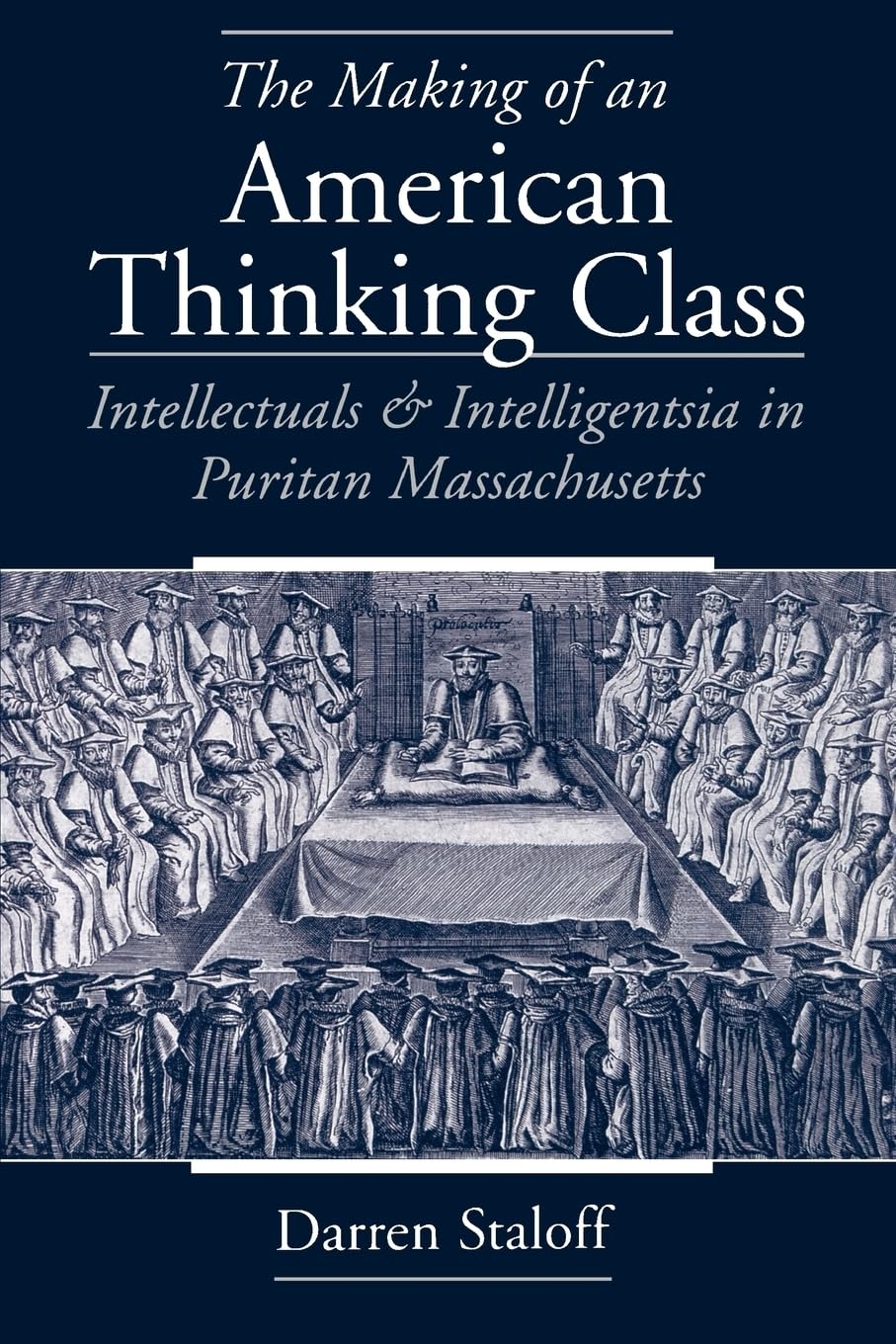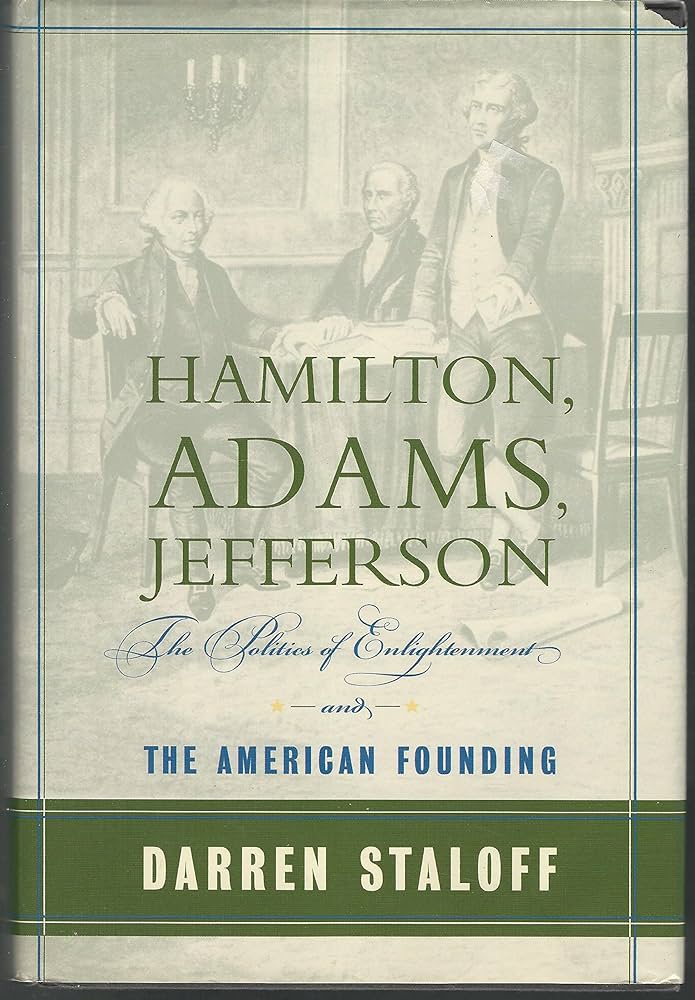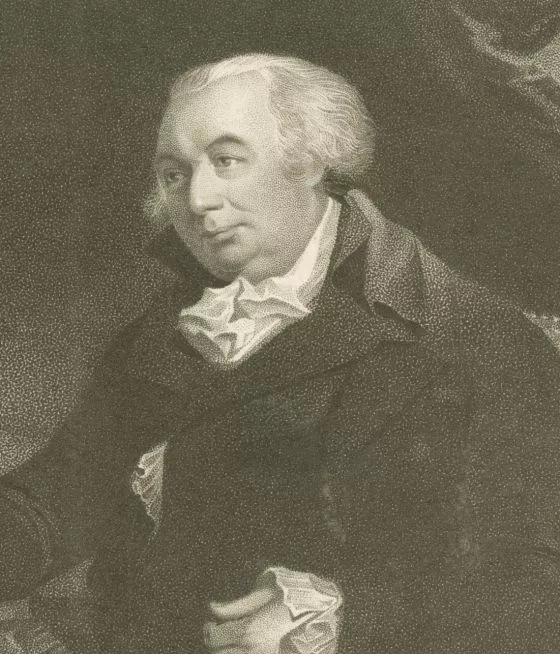
An interview with Professor Darren Staloff
JMC Resident Historian Elliott Drago sat down with JMC faculty partner Darren Staloff to discuss intellectual history, research rabbit holes, and which American founder deserves a biopic. Dr Staloff is a recently retired Professor of History from the City College of New York and the Graduate Center of CUNY.
A republic if the students can keep it
ED: What inspired you to become an intellectual historian?
DS: My encounter with the works of Perry Miller, especially Orthodoxy in Massachusetts and his two volume The New England Mind. At the time I was an aspiring social and political historian of the antebellum South, but I was struck by the eloquence and explanatory power of Miller’s account of seventeenth century New England. I still think his works are the most important and influential in American historiography over the last century.

I became fascinated with trying to explain how a fairly abstruse set of theological and philosophical doctrines could influence, much less determine, the political arrangement and history of an early American region. Answering that question led me to the history and sociology of intellectuals. Of particular use were some of the dissident theorists of what was then the communist block like Miloslav Djilas and George Konrad and Ivan Szelenyi (as well as the American “renegade” sociologist Alvin Gouldner).
What I discovered, and reported in my dissertation and first book, was that an educated elite of committed Puritans in Massachusetts created a sort of religious one-party republic that, while ultimately grounded in the consent of the committed laity, restricted cultural authority and quite a bit of political power to the learned magistrates and ministers. I then traced how, over the course of the century, the laity slowly but steadily restricted that power and limited that authority so that, by the end of the charter period, Massachusetts had devolved into a popular Puritan republic.
ED: Describe your favorite research “rabbit hole,” and the results of that quest.
DS: That would definitely be one that arose as a result of my research for Hamilton, Adams, Jefferson: The Politics of Enlightenment and the American Founding. In the course of my reading the retirement correspondence of Adams and Jefferson, I noted quite a few exchanges on matters of rather erudite philosophy, and thought I might return to these exchanges for subsequent work. In the midst of re-reading these passages, I noticed that they really picked up when Adams referenced “ideology.”

Down the rabbit hole I went to discover that he didn’t mean it in the generic sense, but was actually referring to its first instantiation, the “science of ideas” created by a French philosophic sect (drawing on sensationism and physiocracy) called the ideologues. It turns out that Jefferson, in his later years, was a major acolyte of ideology (he even proposed a department of ideology instead of philosophy at the University of Virginia), and actually translated and published some of their principal political and economic works in the United States.
As Adams read through the corpus of the ideologues, he realized that Jefferson’s understanding of Enlightenment was very different from his own, and actually drew more on the systematic type thinking of 17th century continental rationalism than on his own Lockean/Newtonian empiricism.
ED: What do you consider an underrated moment in the American founding?
DS: The passage of the Northwest Ordinance of 1787. For the first time the united colonies agreed to surrender their separate claims to the area north of the Ohio to the Union and established a realistic and workable program for settlement and territorial government.
Not incidentally, it also assured resources for public education, roads and infrastructure as well as, most importantly, mandated that all of the resultant states would be free of slavery. The Ordinance was not only an important and effective use of national sovereignty (one that was almost immediately affirmed by the first Federal Congress), but also helped ease compromise between northern and southern factions at the Constitutional Convention.
ED: Which American founder deserves their own biopic?
DS: Well, as an historian I am tempted to say James Madison. After all, Jefferson, Hamilton, Adams, and Washington have all been captured in film and/or theater, and Madison was every bit as important as them politically, and maybe more so intellectually. On the other hand, if I was a film producer I would probably pass. He was a remarkably uncharismatic character whose life, outside of politics, was comparatively quiet, if not dull.
An unsung hero
I would opt instead for Gouverneur Morris. An extremely underrated founder, he actually penned our Constitution and seems to have been one of the most frequent contributors to the debates at the Convention. He served on several important committees during the war for independence and was our ambassador to France during most of the Revolution, as well as a Senator and one of the principal promoters of the Erie Canal (he was also the author of the grid pattern for New York City’s street plan).
In contrast to Madison, Morris was an extremely charismatic and flamboyant figure, dashing and urbane as well as a notorious “ladies man.” I think audiences would be kept in rapt attention by his combination of brilliant intellect, principled statesmanship, and utter rakishness.

ED: What has your research taught you about America’s founding principles and history?
DS: More than anything, their remarkably diverse, if not eclectic, character. The founders drew on a vast array of intellectual resources, from Renaissance and seventeenth century republicanism and Enlightened political writing to ancient and classical philosophy as well as basic Judeo-Christian moral theory.
In keeping with their Enlightened training, they did not try to synthesize these diverse principles into an overarching synthetic system. Instead they wove them together in a pragmatic fashion, drawing on experience and practical judgment. Indeed, their intellectual pluralism afforded them, and us ever since, a broad range of principles and ideals to draw on in response to novel and unanticipated challenges.
In a certain sense, this wonderful eclecticism of our founding principles and founding fathers is best exemplified by our national motto, “E Pluribus Unum.”
ED: What’s one thing you wish that every student knew about American history?
DS: The one thing I wish every student knew about American history was how very difficult it is to create a popular system of government grounded in ordered liberty and the rights of the individual. Very few regimes have succeeded in this endeavor and all have faced challenges that threatened either the principle of popular government or ordered liberty. Ancillary to this, I would hope that students would appreciate how very difficult it is to sustain such a regime whose broad popular basis and panoply of individual liberties can’t help but make such a regime as fragile as it is precious.
Finally, they should understand that, once lost, such freedom and broad political participation is extremely difficult to recover. Benjamin Franklin is reputed to have responded when asked what kind of government the Constitutional Convention produced, “A republic, if you can keep it.” I would hope students can appreciate how very important it is to “keep it” if they can.
ED: Thank you for taking the time to be interviewed, we look forward to reading more of your scholarship!
Elliott Drago serves as the JMC’s Resident Historian and Editorial Manager. He is a historian of American history and the author of Street Diplomacy: The Politics of Slavery and Freedom in Philadelphia, 1820-1850 (Johns-Hopkins University Press, 2022).
